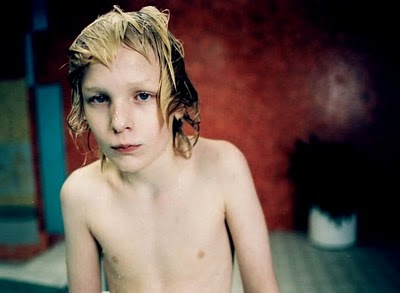I had never seen
The Texas Chainsaw Massacre, the movie. I was a snob about it. And I was wrong.
This is an essential movie in the canon of horror movies. It is wonderful. (I know I am getting excited about something you already know, but please bear with me).
Before I saw this mother of all slasher films, I had already sat through and thoroughly disliked its more commercial spawn:
Halloween, Friday the 13th, etc. But this is a film of great purity. Everything that happens in it makes total sense. Never once is one forced to ask, "why don't you call the police or why are you alone in the house when you could happily be at the Dairy Queen and out of harm's way?"
Now, does it make total sense that a bunch of teenagers run into three generations of depraved males with a penchant for human butchery and blood? Well, yeah. It's Texas, after all. (Just kidding).
Of course, the house on the hill with the nice porch is the one in which the most unspeakable evil lives. This is America. And America has some deeply mad dark places there, like my friend Sarah Palin, a scary construct herself, would say.
There are many things I love about this film. The teenagers are horrid. There is one fat guy on a wheelchair who is really a pest and it is clear that he is a burden no one wants do deal with, including his sister, who resents having to lug him around. Nowadays "fatty guy on wheelchair" means practically an angel, but in the glorious, drug-addled seventies it meant a pest. Because he is chair bound, fat, ugly and insufferable, he is the only one who seems to be aware of the darkness around him. The rest have the insouciance, the golden sheen and buffed bodies of youth, and you know they are going to be punished for it. What they run into in a sunny Summer day in Texas is just sheer, crazy evil.
I love that there is absolutely no attempt to psychoanalyze it or explain it. It just is and it happens to serve barbecue. Me being me, I thought the sight of a BBQ sign was a sure omen of refuge and civilization. I was wrong.
Now, I'm not a fan of gore or slasher films. I don't find tons of blood and human flesh that scary.
I like my scares more on the either supernatural or the psychological variety, but as long as the movie scares me, I consider it a wild success.
Texas Chainsaw Massacre is most scary between the action, as is true of all great scary movies. Just the unbearable amount of knowledge that terrible stuff will happen is enough. Also, most of the murders happen quite soon into the movie, and quite quickly. And then you wonder what's going to happen for the next hour.
The stuff that happens is terrible, but Tobe Hooper, the director, just shows a bit of it. He knows that a taste is enough for imagination to go wild. It's more the grotesquerie of the evil men, with their dessicated human flesh masks and their literal rottenness of body and soul, that makes it really out there. The use of sound is also very effective. It's so over the top, it is completely disorienting.
There is a fantastic scene where one of the girls wakes up in this room full of chicken feathers (always a ghastly sight) and she is numb and lost and disoriented and the camera takes her point of view as she discovers all the crazy stuff in that room and then it takes a while for her to come to her senses and she is so paralyzed by fear, she can't get up. It's like those nightmares when one tries to scream and no sound comes out. Lovely and terrifying.
I love the nonchalance of the unsuspecting teens. They roam about this crazy world in total innocence of danger. Their first encounter with a young, extraordinarily creepy hitchhiker leaves most of them unruffled, despite the fact that the guy looks like a ghoul and slashes himself and fatty with a very scary razor, and despite the fact that he shows them some horrid polaroids. Why would they pick someone like that up? Because they're young and it's the seventies and it was cool to be cool to other young people like you.
They run out of gas and go into an old gas station and BBQ joint that happens to have NO GAS. What place in America has no gas? But it's the seventies, so it is feasible. They should have filled up the tank at the nice Gulf station near the cemetery, but no, because they are young and, unlike me, never worry about running out of gas.
The owner of the gas station has a moronic hunchback attendant who insists on lathering the windshield, which should give everybody pause and perhaps the thought to call it a day and go home, and the owner himself has more than a passing resemblance to the hitchhiker, but these guys are still oblivious to creepiness.
They die senselessly and except for one resilient girl, without putting up much of a fight. There are no heroes to come and save them.
This movie reminded me of another movie of Beware of the Hillbillies variety. It reminded me of
Deliverance. Also from the seventies, no?
Very disturbing. The end is fabulous too. I don't think they were cynically trying to exploit the return of Leatherface, but the fact that he is seen dancing wildly with a chubby Mexican running for his life nearby does not bode well. And then one thinks about the victim who escaped and her trauma and the movie leaves an endless unresolved chill, as all scary movies should.



















